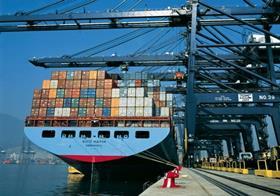
AP Moller–Maersk has revealed that it is accelerating its efforts to decarbonise marine operations with the launch of the world’s first carbon neutral liner vessel in 2023, seven years ahead of the initial 2030-ambition.
The logistics group said that its plans had been fast-tracked by advances in technology and increasing customer demand for sustainable supply chains,
All future Maersk owned new buildings will have dual fuel technology installed, enabling either carbon neutral operations or operation on standard very low sulphur fuel oil (VLSFO).
“AP Moller–Maersk’s ambition is to lead the way in decarbonising global logistics,' said CEO Søren Skou. 'Our customers expect us to help them decarbonise their global supply chains, and we are embracing the challenge, working on solving the practical, technical and safety challenges inherent in the carbon neutral fuels we need in the future.
'Our ambition to have a carbon neutral fleet by 2050 was a moonshot when we announced in 2018,' he continued. 'Today we see it as a challenging, yet achievable target to reach.”
According to Maersk, around half of its 200 largest customers have set – or are in the process of setting – science-based or zero carbon targets for their supply chains.
Vessel specifications
Maersk’s methanol feeder vessel will have a capacity of around 2,000 TEU and be deployed in one of its intra-regional networks.
While the vessel will be able to operate on standard VLSFO, the plan is to operate the vessel on carbon neutral e-methanol or sustainable bio-methanol from day one.
“It will be a significant challenge to source an adequate supply of carbon neutral methanol within our timeline to pioneer this technology,' noted Henriette Hallberg Thygesen, CEO of fleet and strategic brands. 'Our success relies on customers embracing this groundbreaking product and strengthened collaboration with fuel manufacturers, technology partners and developers to ramp up production fast enough.
'We believe our aspiration to put the world’s first carbon neutral liner vessel in operation by 2023 is the best way to kick start the rapid scaling of carbon neutral fuels we will need.”



